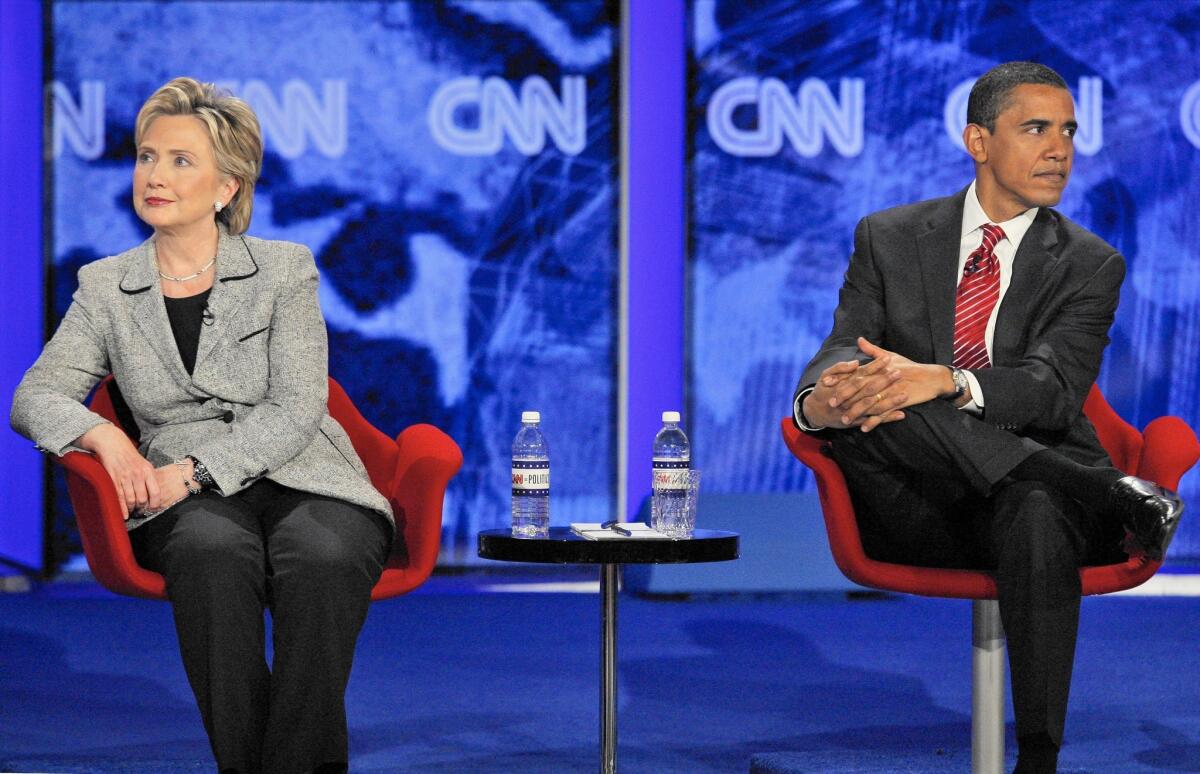Hillary Clinton returning to Nevada, scene of ugly 2008 primary battle

- Share via
Reporting from LAS VEGAS — In the long, bitter campaign fight between Barack Obama and Hillary Rodham Clinton, few states witnessed as much rancor as Nevada.
The state’s 2008 Democratic caucus, scheduled early in the race to boost its influence, yielded a federal lawsuit, a fight between labor unions, charges of voter intimidation and accusations of prejudice, among other bricks that were heaved between the battling candidates and their backers — including a livid President Clinton.
Fittingly, the contest ended in a split decision, with Hillary Clinton winning the popular vote and Obama claiming the most nominating delegates to the Democratic National Convention.
Against that contentious backdrop, Clinton will return to Nevada on Tuesday to host the latest in a series of small-scale appearances undertaken since she formally announced her second presidential bid last month.
She will also test the relations frayed by that fratricidal 2008 contest.
Much of the acrimony involved Las Vegas’ Culinary Union, the state’s largest and most powerful labor organization. With 60,000 members at the time, many of them Democratic-leaning and politically active, the organization’s endorsement was highly sought by the party’s large field of hopefuls, who spent months courting union members and their leadership.
Obama ended up winning the official endorsement, a boost after Clinton’s surprise victory in the New Hampshire primary. (Nevada is slotted as the third contest on the nominating calendar, after the Iowa caucuses and New Hampshire primary.) But the decision led to a split within Democratic ranks and hostilities that many have not forgotten.
“We have members who remember the caucuses vividly and talk about them almost like a civil war battle,” said Yvanna Cancela, political director of the Culinary Union’s Local 226, which represents the workers who service Las Vegas’ life-blood tourist and gambling industries. “But I think enough time has passed where we can move on from the 2008 caucus.”
Under the system, delegates were allotted on the basis of voting in party-sanctioned gatherings, or caucuses, held throughout the state.
Two days after the union formally endorsed Obama, lawyers for the Nevada State Education Assn. filed a federal lawsuit challenging the voting system. The timing of the teachers union suit — long after the rules had been established by the national Democratic Party — and the involvement of several Clinton supporters turned the legal fight into a proxy battle between the rival candidates.
Clinton’s allies objected to polling sites at several casinos on the Las Vegas Strip, placed there in an effort to allow shift workers to participate in the caucuses, which were held during daylight hours on a Saturday.
D. Taylor, then head of Local 226, denounced the suit as “despicable” and “disgusting” and a deliberate effort to disenfranchise women, minorities and working people. Clinton distanced herself from the lawsuit, saying it was up to the courts and the state Democratic Party to hash out, but suggested it had merit.
Her husband was more vocal, angrily asserting the job-site balloting would unfairly give more weight to the votes of casino workers — a group that is heavily Latino — and he accused the Culinary Union of strong-arming members to back Obama.
Obama’s allies fired back with a Spanish-language radio ad that accused a “shameless” Hillary Clinton of trying to repress the Latino vote. “Vote for a president who respects us and respects our right to vote,” the spot urged in support of then-Sen. Obama.
In the end, a judge upheld the casino sites and Clinton won not only the popular vote but seven of the nine caucuses held on the Las Vegas Strip, thanks in part to vigorous campaigning by Bill Clinton and their daughter, Chelsea.
“It’s not too often that you have the former president of the United States greet you as go into your caucus or have Chelsea Clinton leaflet you,” Taylor told the Las Vegas Sun at the time. “It was a full onslaught of Clinton, and I congratulate her. She won.”
In a recent interview at the Culinary Union headquarters, in an industrial area just off the Strip, Taylor said there were no lingering hard feelings.
“Politics is a tough, rough-and-tumble sport,” said Taylor, now head of the union’s national parent organization, Unite Here. “Just like any competitive thing, at the end of the day you recognize and respect each other and then move on.”
That said, the Culinary Union is in no hurry to endorse a candidate for 2016. Its focus, according to Taylor, is on the current legislative session in Carson City, where state lawmakers are debating a number of bills that could weaken the influence of organized labor.
He and his members, Taylor said, want to take time to consider the presidential field once it is set. “Whenever I go to Baskin-Robbins, I don’t know exactly what I’m going to order,” he said. “I like to see the choices.”
Former Maryland Gov. Martin O’Malley, who is considering a bid for the Democratic nomination, visited the Culinary Union headquarters in September during a midterm election swing on behalf of Nevada Democrats. Independent Sen. Bernie Sanders of Vermont, who entered the Democratic race on Thursday, held a town-hall-style meeting at the union headquarters in March.
Taylor and the Culinary Union leadership have yet to hear from the Democratic front-runner or her husband.
A Clinton spokeswoman, state campaign director Emmy Ruiz, said the candidate “will work to earn every vote” in Nevada, “including the Culinary Workers Union Local 226.”
Twitter: @markzbarabak
More to Read
Get the L.A. Times Politics newsletter
Deeply reported insights into legislation, politics and policy from Sacramento, Washington and beyond. In your inbox three times per week.
You may occasionally receive promotional content from the Los Angeles Times.











